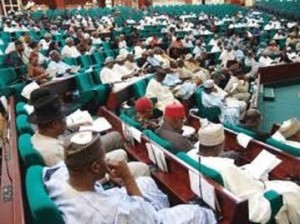Politics
Defections: Why Senators, Reps May Lose Seats

Senators who dumped their party for others because they lost in their bid for nomination risk losing their seats.
This is because the Constitution provides a strict basis for defection, outside which the defecting lawmaker loses his seat.
For such lawmakers to retain their seats, they must prove that the constitutional stipulation for defection was met.
Eighteen senators in the All Progressives Congress (APC) are said to be making moves to join opposition parties after losing the primaries.
Already, the party has lost seven senators to the Peoples Democratic Party (PDP) and the New Nigeria Peoples Party (NNPP).
The PDP also had no fewer than four senators leave for other parties.
The Supreme Court had held that a lawmaker who defects to another party would lose his seat.
In 2015, after almost four years of dumping the Labour Party (LP), the Supreme Court ordered a member of the House of Representatives representing Akure South/North Federal Constituency of Ondo State, Ifedayo Abegunde, to give up his seat.
It was on account of his defection from the party that sponsored his election.
Abegunde defected from the LP to the defunct Action Congress of Nigeria (ACN) in 2011.
In a unanimous decision by the seven-man panel led by the former Chief Justice of Nigeria, Mahmud Mohammed, the apex court held that a legislator’s defection to another party can only be justified if there is a division in the national structures that incapacitated the party.
The Supreme Court held that Abegunde’s defection could not be justified since his excuse of purported division in LP was not in existence at the national level.
The court noted that the “division” or “factionalisation” of LP cited by Abegunde as his excuse for abandoning the party was only at the state level.
The judgment affirmed the concurrent decisions of the Akure divisions of the Federal High Court and Court of Appeal, both of which had earlier ruled that Abegunde’s defection was unjustifiable.
More recently, the lower courts, relying on the Supreme Court judgment, have maintained that lawmakers cannot defect where there is no division in their party.
On March 21, Justice Taiwo Taiwo of the Federal High in Abuja declared the seats of 20 Cross River lawmakers vacant over their defection from the PDP to the APC.
He ruled that their claim of rancour in the PDP, which necessitated their defection to APC, was a ploy to mislead the court.
The judge, who granted all the reliefs sought by the PDP, held that it was disheartening that politicians treat citizens as if they do not matter once they get into office.
“We cannot continue in sin and expect grace to abound,” the judge held.
On March 8, Justice Inyang Ekwo ordered 16 lawmakers in the Ebonyi State House of Assembly, who defected from the PDP to the APC, to vacate their seats.
The judge declared that by Section 221 of the Constitution and the democratic system of governance operated in Nigeria, votes are won by political parties and not candidates.
He declared that the votes won at an election are retained by the party irrespective of the death or exit of the candidate.
Also on April 22, Justice Donatus Okorowo of the Federal High Court in Abuja ordered former Speaker, Yakubu Dogara, to vacate his seat as the member representing Dass, Tafawa Balewa and Bogoro Federal Constituency of Bauchi State.
The judge declared that having defected from PDP to the APC, Dogara was no longer qualified to occupy the seat by virtue of Section 68(1)(g) of the Constitution.
Justice Okorowo aligned with the argument of the PDP that by defecting from the party that sponsored him to the ninth National Assembly before the expiration of his tenure, Dogara ought to vacate the seat.
The judge, who held that the action of the lawmaker is prohibited by law, noted that the aim of Section 68(1)(g) was to check political prostitution by legislators.
A Senior Advocate of Nigeria (SAN) and former Ekiti State Attorney-General and Commissioner for Justice, Gboyega Oyewole (SAN), told The Nation that the law is settled on how a lawmaker can lose his seat.
He referred to Section 68(1)(g) of the 1999 Constitution (as amended), which provides: “(1) A member of the Senate or of the House of Representatives shall vacate his seat in the House of which he is a member if- (g) being a person whose election to the House was sponsored by a political party, he becomes a member of another political party before the expiration of the period for which the House was elected, provided that his membership of the latter party is not as a result of a division in the political party of which he was previously a member or of a merger of two or more political parties or factions by one of which he was previously sponsored.”
Oyewole also referred to the Supreme Court judgment which affirmed Section 68 (1) in Abegunde vs. Ondo State House of Assembly & Ors (2015) LPELR-24588(SC) at PP 33 – 33 Paras C – E.
Justice Musa Dattijo Muhammad of the Supreme Court held: “The principles enunciated by this court in the two cases, Fedeco v. Goni supra and AG Federation v. Abubakar supra, is to the effect that only such factionalisation, fragmentation, splintering or ‘division’ that makes it impossible or impracticable for a political party to function as such will, by virtue of the proviso to Section 68(1) (g), justify a person’s defection to another party and the retention of his seat for the unexpired term in the house in spite of the defection.
“Otherwise, as rightly held by the courts below, the defector automatically loses his seat.”
Oyewole added: “In view of the unambiguous provision of the 1999 Constitution (as amended) and the well-considered judgment of the apex court in Ifedayo Abegunde v. Ondo State House of Assembly (Supra), any lawmaker who defects from the APC to another political party before the expiration of the tenure of the present National Assembly is deemed to have vacated his seat.
“The presiding officer of that House i.e. Senate President or Speaker of the House of Representatives is duly empowered to declare the seat of such lawmaker vacant.”
A constitutional lawyer Chief Mike Ozekhome (SAN), agreed with Oyewole and added that the Senators must be able to prove that there is a major crisis in the APC on whose platform they were elected.
He said they must show there also exists a division within the party or that the party has merged with another one such as to have lost its original identity.
“They are subject to losing their seats if they cannot show these factors,” he said, adding, however, that they cannot be replaced without a by-election.
The Senators who left APC are Yahaya Abdullahi (to the PDP), Adamu Aliero (to PDP), Ahmad Baba-Kaita (to PDP), Haliru Jika (to NNPP), Francis Alimikhena (to PDP), Ibrahim Shekarau (to NNPP) and Lawal Yahaya Gumau (to NNPP).
PDP senators who recently defected are Albert Bassey Akpan (to Young Progressives Party (YPP), Kola Balogun (to APC), Ezenwa Onyewuchi (to Labour Party (LP) and Enyinnaya Abaribe (to All Progressives Grand Alliance (APGA).
APC National Chairman Abdullahi Adamu led Deputy National Chairman Abubakar Kyari and National Secretary Iyiola Omisore – all of them former senators – to a two-hour meeting with the APC caucus in the Senate on Wednesday.
Adamu pleaded with the senators, many of who are displeased with the outcome of the primaries, to have a rethink and allow the party to address their grievances.










1 Comment